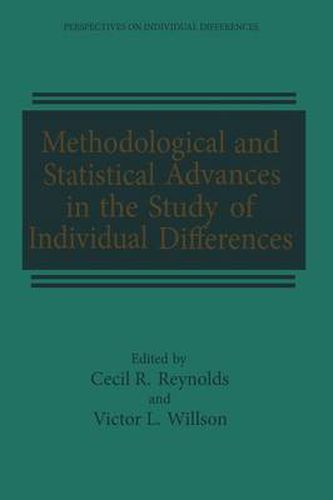Readings Newsletter
Become a Readings Member to make your shopping experience even easier.
Sign in or sign up for free!
You’re not far away from qualifying for FREE standard shipping within Australia
You’ve qualified for FREE standard shipping within Australia
The cart is loading…






This title is printed to order. This book may have been self-published. If so, we cannot guarantee the quality of the content. In the main most books will have gone through the editing process however some may not. We therefore suggest that you be aware of this before ordering this book. If in doubt check either the author or publisher’s details as we are unable to accept any returns unless they are faulty. Please contact us if you have any questions.
Differential psychology, or the psychology of individual differences as it is better known, is perhaps the single most important basic psychological science that underlies professional practice in psychology. The recent age of behaviorism all but ignored individual differences, but in this decade the study has emerged from relative dormancy with a new vitality, fueled by new concepts, technologies, statistics, and new viewpoints on old ideas that are moving us forward. This work is intended to be a review of as well as a primer on many of these advances and new approaches to the study of individual differences. The venerable, interesting, and often controversial Eysenck opens the volume with a review of recent results and new techniques for unlocking the physiological basis of what is commonly understood to be intelligence. Eysenck and his students, in his London laboratory, have been fostering advances in this field for more than four decades. Their latest work could be the most exciting of Eysenck’s illustrious, scholarly career. Eysenck’s eye-opening, innovative work on the relationship between evoked potentials and performance on traditional psychometric measures, presented with a new slant, is certain to attract much attention in coming years. Eysenck and Barrett’s chapter is followed by a closely related work by Arthur Jensen, who gives us a revitalizing look at the concepts of Sir Francis Galton, the founder of the psychology of individual differences.
$9.00 standard shipping within Australia
FREE standard shipping within Australia for orders over $100.00
Express & International shipping calculated at checkout
This title is printed to order. This book may have been self-published. If so, we cannot guarantee the quality of the content. In the main most books will have gone through the editing process however some may not. We therefore suggest that you be aware of this before ordering this book. If in doubt check either the author or publisher’s details as we are unable to accept any returns unless they are faulty. Please contact us if you have any questions.
Differential psychology, or the psychology of individual differences as it is better known, is perhaps the single most important basic psychological science that underlies professional practice in psychology. The recent age of behaviorism all but ignored individual differences, but in this decade the study has emerged from relative dormancy with a new vitality, fueled by new concepts, technologies, statistics, and new viewpoints on old ideas that are moving us forward. This work is intended to be a review of as well as a primer on many of these advances and new approaches to the study of individual differences. The venerable, interesting, and often controversial Eysenck opens the volume with a review of recent results and new techniques for unlocking the physiological basis of what is commonly understood to be intelligence. Eysenck and his students, in his London laboratory, have been fostering advances in this field for more than four decades. Their latest work could be the most exciting of Eysenck’s illustrious, scholarly career. Eysenck’s eye-opening, innovative work on the relationship between evoked potentials and performance on traditional psychometric measures, presented with a new slant, is certain to attract much attention in coming years. Eysenck and Barrett’s chapter is followed by a closely related work by Arthur Jensen, who gives us a revitalizing look at the concepts of Sir Francis Galton, the founder of the psychology of individual differences.